C. S. Lewis Quotes
Most popular C. S. Lewis Quotes

Of all tyrannies, a tyranny sincerely exercised for the good of its victims may be the most oppressive. It would be better to live under robber barons than under omnipotent moral busybodies. The robber baron's cruelty may sometimes sleep, his cupidity may at some point be satiated; but those who torment us for our own good will torment us without end for they do so with the approval of their own conscience.
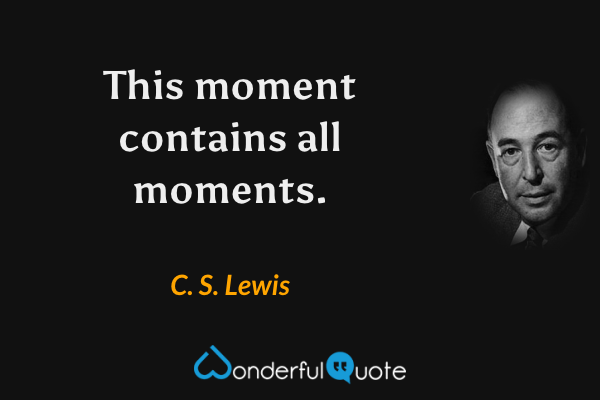
This moment contains all moments.
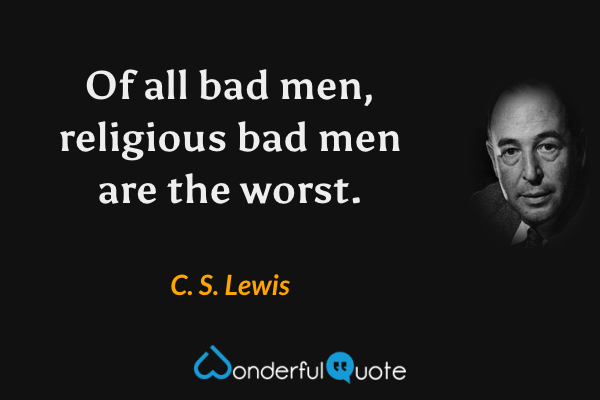
Of all bad men, religious bad men are the worst.
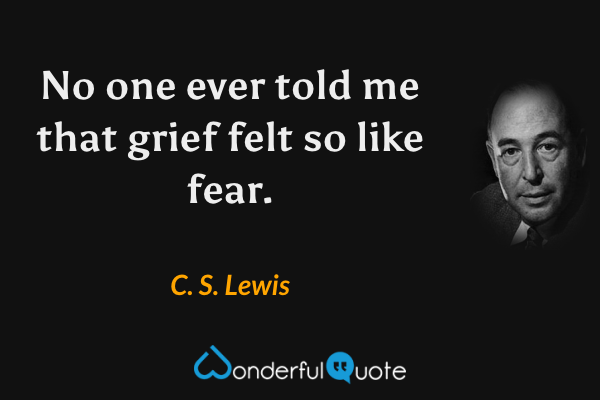
No one ever told me that grief felt so like fear.
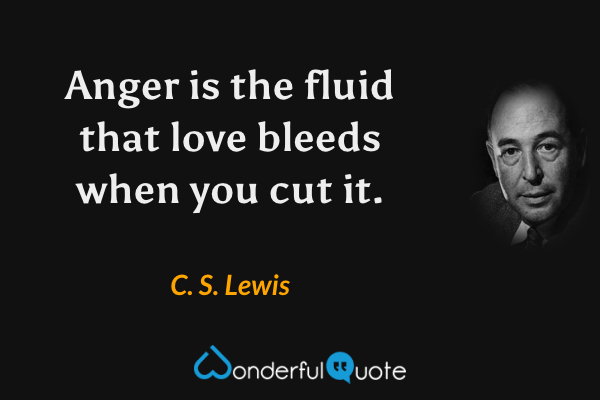
Anger is the fluid that love bleeds when you cut it.
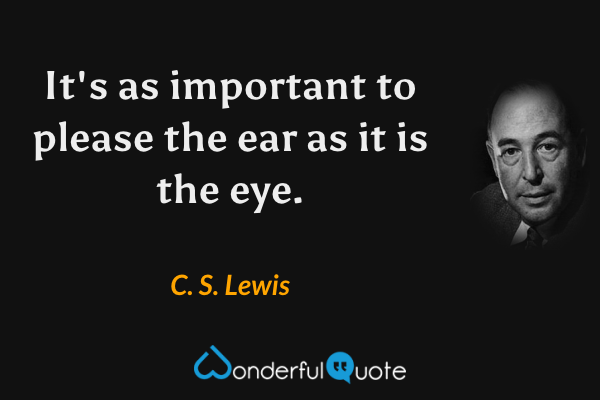
It's as important to please the ear as it is the eye.
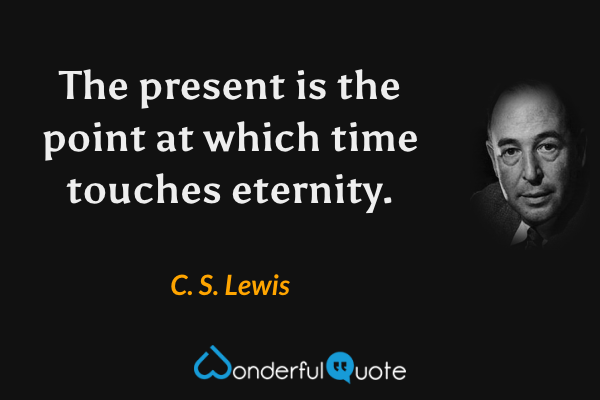
The present is the point at which time touches eternity.

Though our feelings come and go, God's love for us does not.

It's not the load that breaks you down, It's the way you carry it.
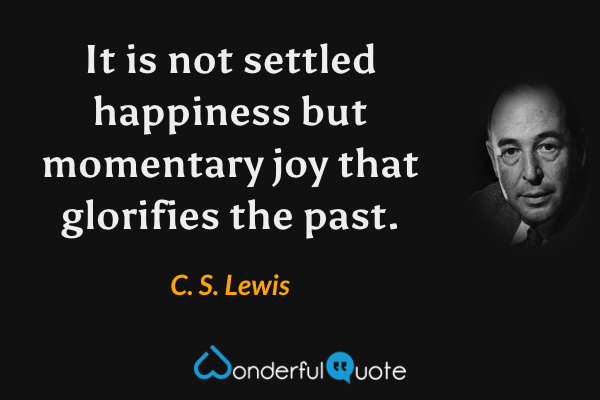
It is not settled happiness but momentary joy that glorifies the past.
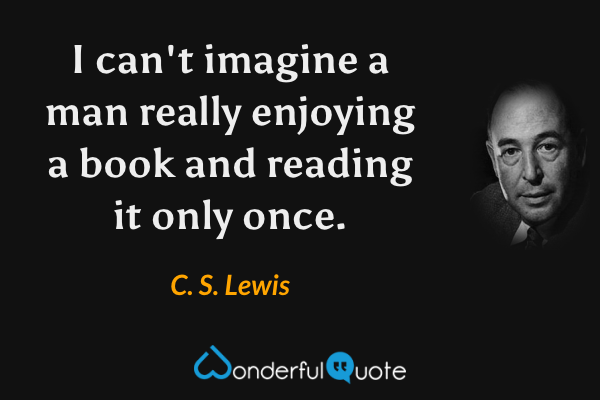
I can't imagine a man really enjoying a book and reading it only once.

Friendship is . . . the sort of love one can imagine between the angels.
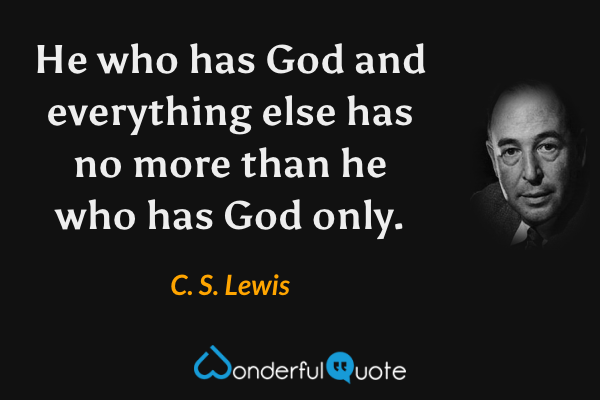
He who has God and everything else has no more than he who has God only.
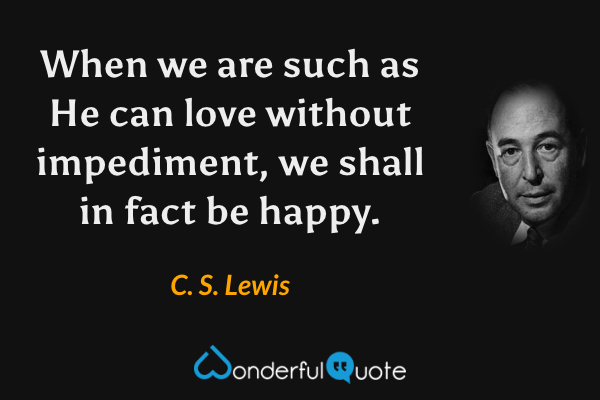
When we are such as He can love without impediment, we shall in fact be happy.

Often when I pray I wonder if I am not posting letters to a non-existent address.

But God will look to every soul like its first love because He is its first love.

I use the word Miracle to mean an interference with Nature by supernatural power.
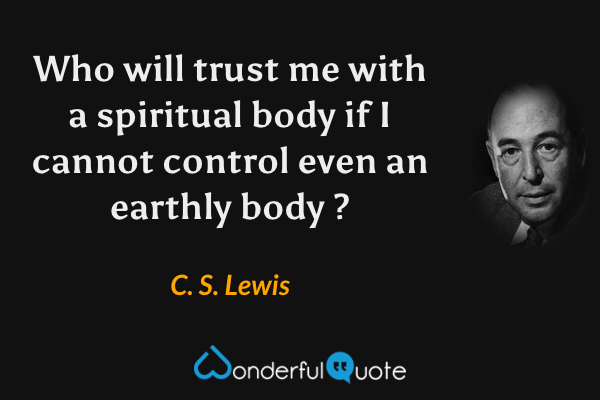
Who will trust me with a spiritual body if I cannot control even an earthly body ?
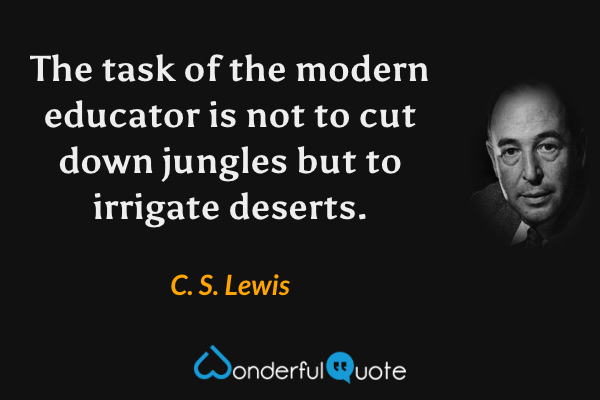
The task of the modern educator is not to cut down jungles but to irrigate deserts.
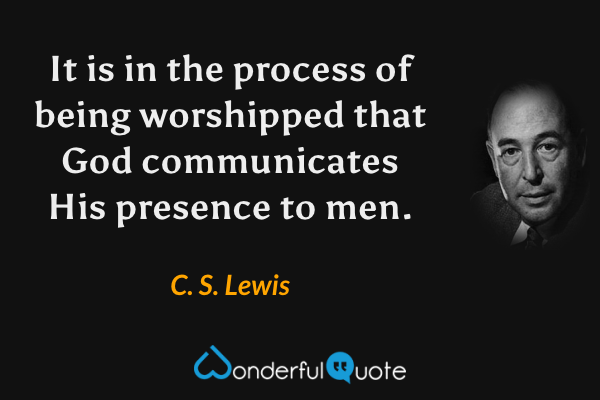
It is in the process of being worshipped that God communicates His presence to men.

You never know what you can do until you try, and very few try unless they have to.
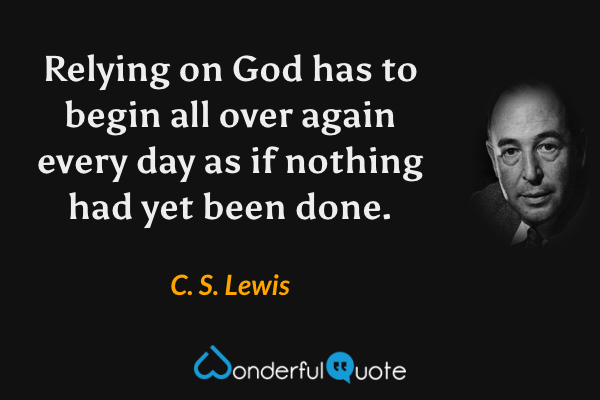
Relying on God has to begin all over again every day as if nothing had yet been done.

Aim at heaven and you will get earth thrown in. Aim at earth and you will get neither.

What we learn from experience depends on the kind of philosophy we bring to experience.
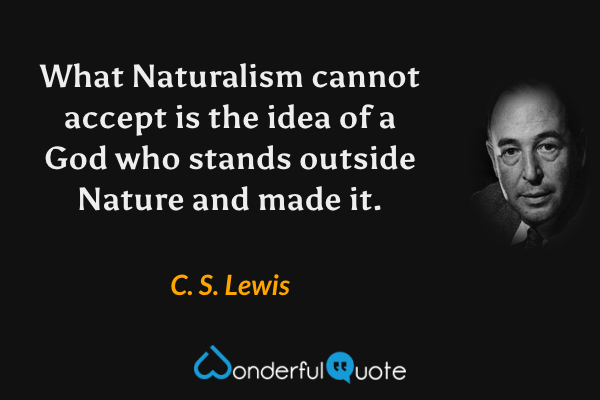
What Naturalism cannot accept is the idea of a God who stands outside Nature and made it.

Wickedness, when you examine it, turns out to be the pursuit of some good in the wrong way.
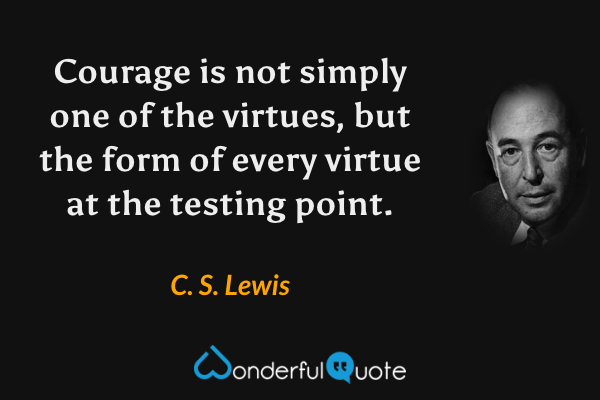
Courage is not simply one of the virtues, but the form of every virtue at the testing point.
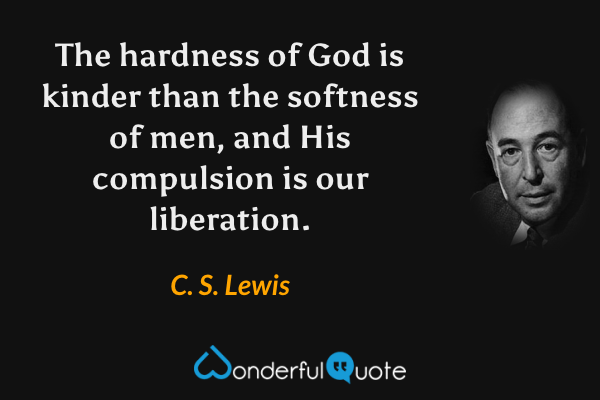
The hardness of God is kinder than the softness of men, and His compulsion is our liberation.
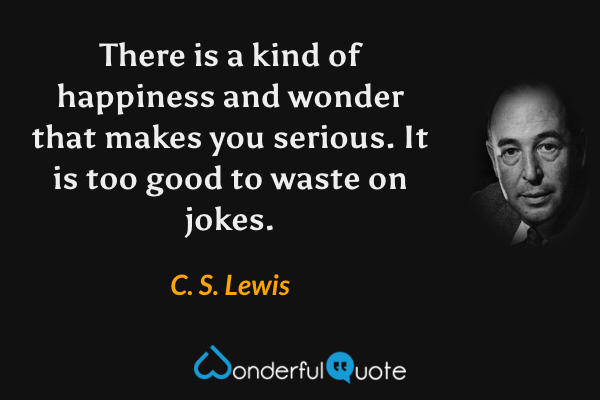
There is a kind of happiness and wonder that makes you serious. It is too good to waste on jokes.
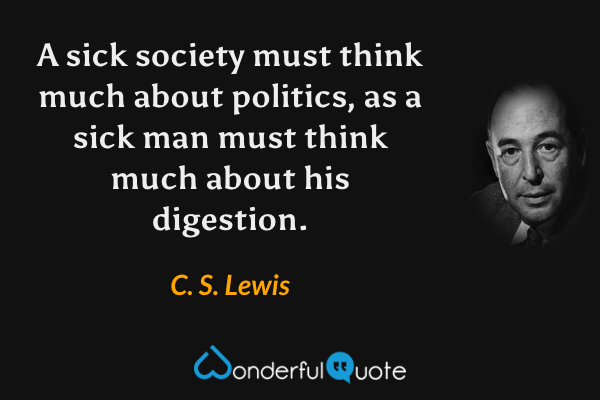
A sick society must think much about politics, as a sick man must think much about his digestion.
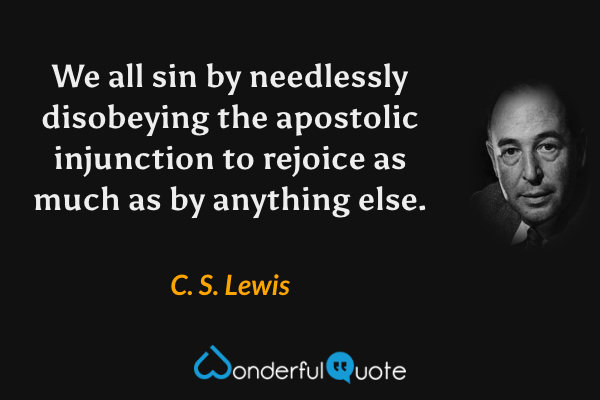
We all sin by needlessly disobeying the apostolic injunction to rejoice as much as by anything else.

If a thing is free to be good it is also free to be bad. And free will is what has made evil possible.
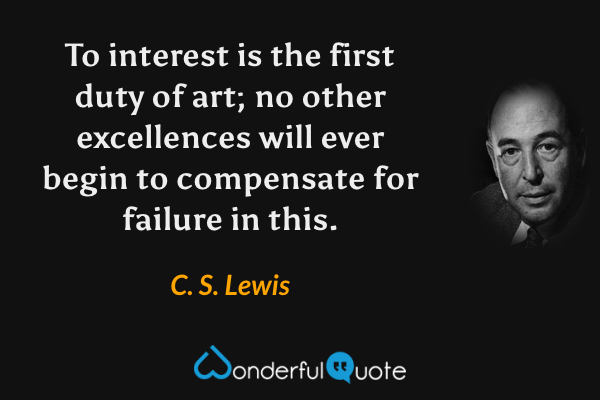
To interest is the first duty of art; no other excellences will ever begin to compensate for failure in this.
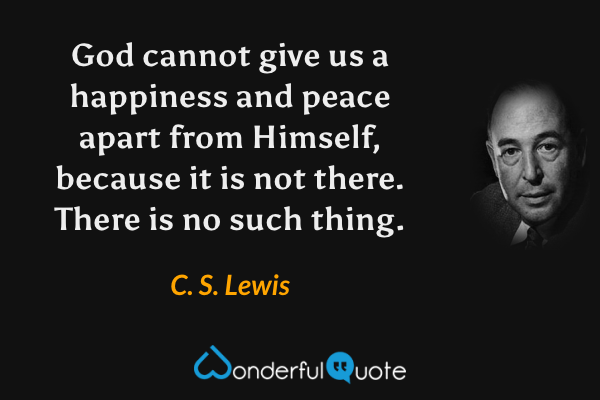
God cannot give us a happiness and peace apart from Himself, because it is not there. There is no such thing.

I do not like church here at all because it is so frightfully high church that it might as well be Roman Catholic.

Many things—such as loving, going to sleep, or behaving unaffectedly—are done worst when we try hardest to do them.

The Future...something which everyone reaches at the rate of sixty minutes an hour, whatever he does, whoever he is.

The future is something which every man reaches at the rate of sixty minutes an hour, whatever he do, whoever he is.
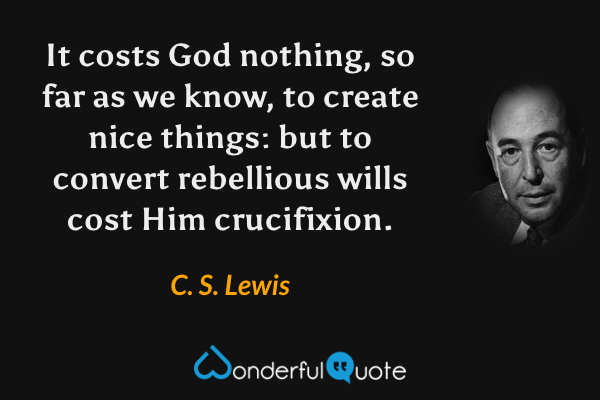
It costs God nothing, so far as we know, to create nice things: but to convert rebellious wills cost Him crucifixion.
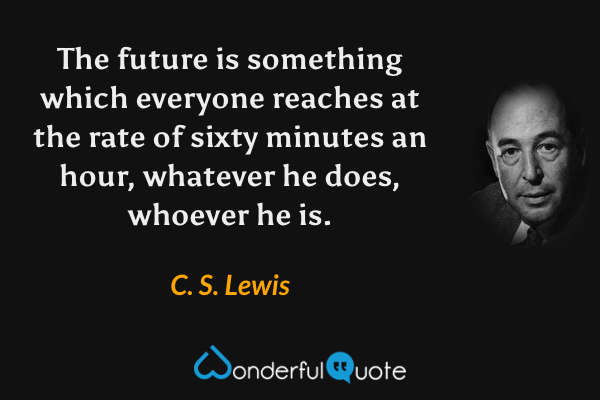
The future is something which everyone reaches at the rate of sixty minutes an hour, whatever he does, whoever he is.
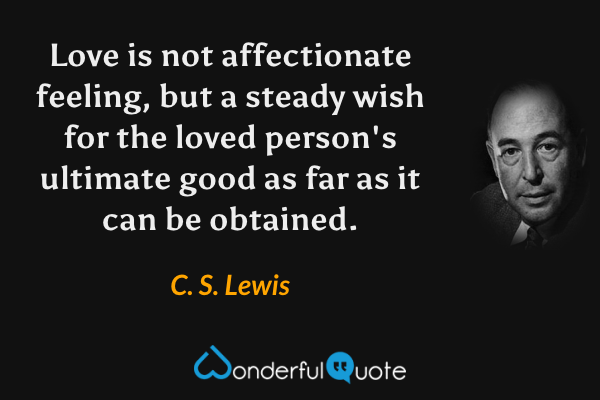
Love is not affectionate feeling, but a steady wish for the loved person's ultimate good as far as it can be obtained.

When I became a man I put away childish things, including the fear of childishness and the desire to be very grown up.

Forgiving and being forgiven are two names for the same thing. The important thing is that a discord has been resolved.
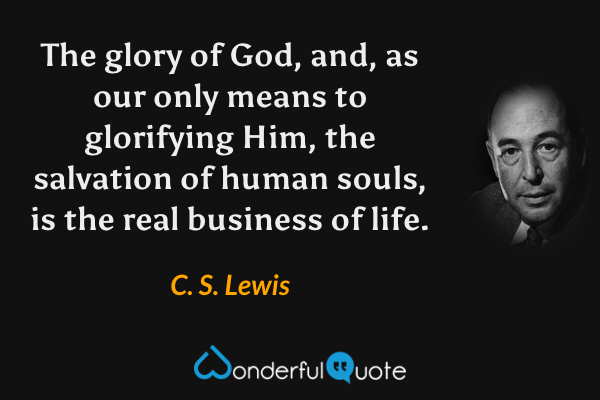
The glory of God, and, as our only means to glorifying Him, the salvation of human souls, is the real business of life.
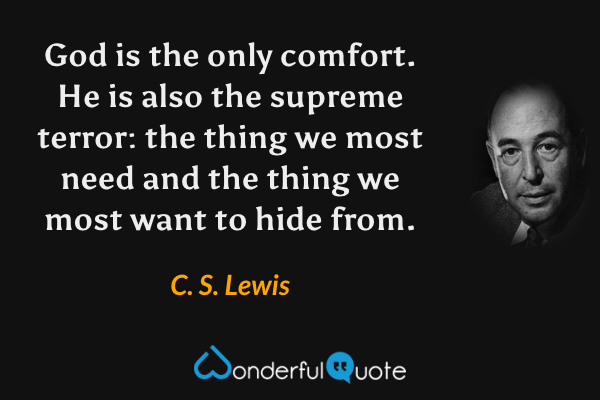
God is the only comfort. He is also the supreme terror: the thing we most need and the thing we most want to hide from.

Seeing is not believing. For this reason, the question whether miracles occur can never be answered simply by experience.
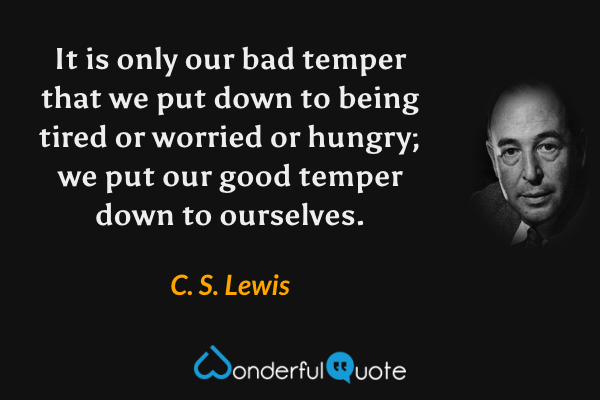
It is only our bad temper that we put down to being tired or worried or hungry; we put our good temper down to ourselves.

I do not believe one can settle how much we ought to give. I am afraid the only safe rule is to give more than we can spare.
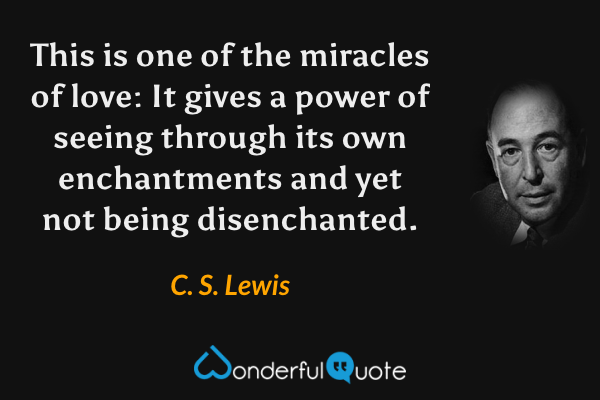
This is one of the miracles of love: It gives a power of seeing through its own enchantments and yet not being disenchanted.

Life at a vile boarding-school is in this way a good preparation for the Christian life, that it teaches one to live by hope.

Pain insists upon being attended to. God whispers to us in our pleasures, speaks in our conscience, but shouts in our pains.
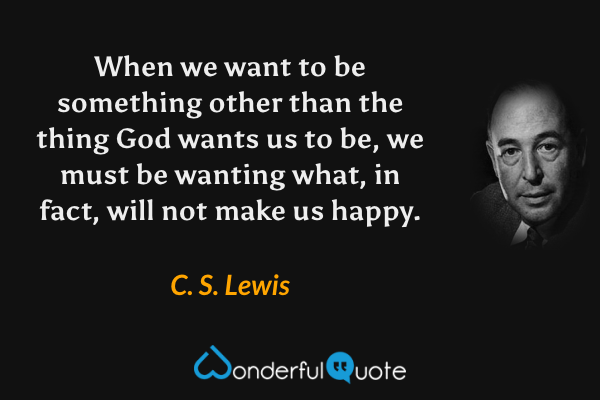
When we want to be something other than the thing God wants us to be, we must be wanting what, in fact, will not make us happy.
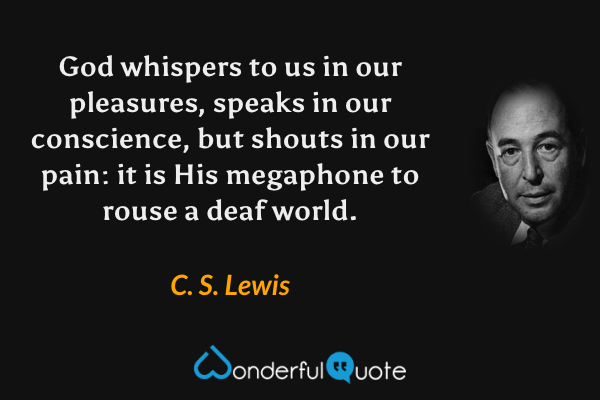
God whispers to us in our pleasures, speaks in our conscience, but shouts in our pain: it is His megaphone to rouse a deaf world.
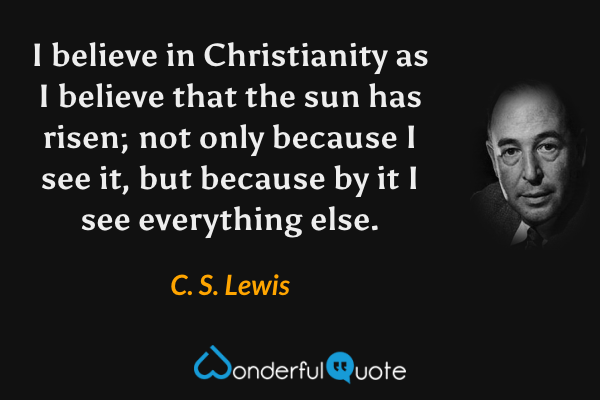
I believe in Christianity as I believe that the sun has risen; not only because I see it, but because by it I see everything else.

Goodness is, so to speak, itself: badness is only spoiled goodness. And there must be something good first before it can be spoiled.
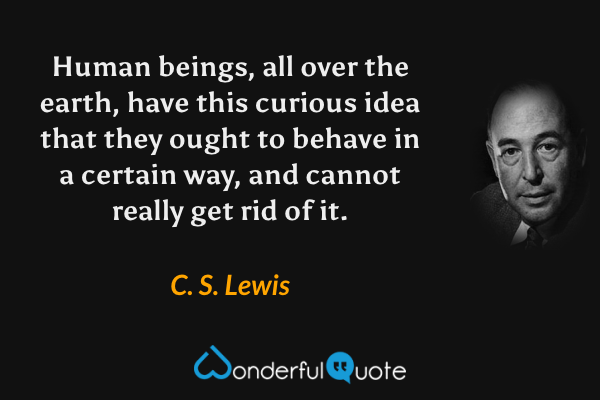
Human beings, all over the earth, have this curious idea that they ought to behave in a certain way, and cannot really get rid of it.

A real desire to believe all the good you can of others and to make others as comfortable as you can will solve most of the problems.

Because free will, though it makes evil possible, is also the only thing that makes possible any love or goodness or joy worth having.
![It [Christianity] is precisely the story of a great Miracle. A naturalistic Christianity leaves out all that is specifically Christian. - C. S. Lewis quote.](/img/q/54/854A-it-christianity-is-precisely-the-story-great-miracle-naturalistic-christianity-c-s-lewis.png)
It [Christianity] is precisely the story of a great Miracle. A naturalistic Christianity leaves out all that is specifically Christian.

Every uncorrected error and unrepented sin is, in its own right, a fountain of fresh error and fresh sin flowing on to the end of time.
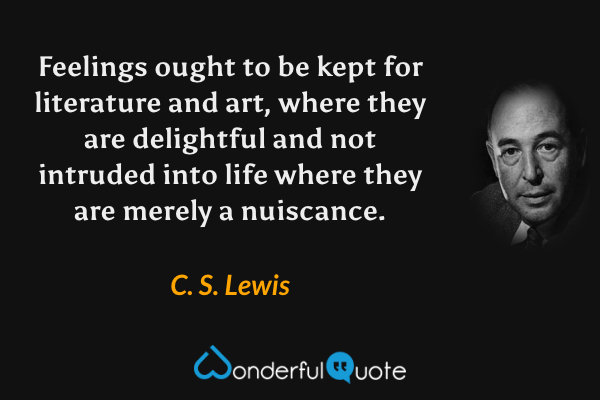
Feelings ought to be kept for literature and art, where they are delightful and not intruded into life where they are merely a nuiscance.

The safest road to hell is the gradual one—the gentle slope, soft underfoot, without sudden turnings, without milestones, without signposts.
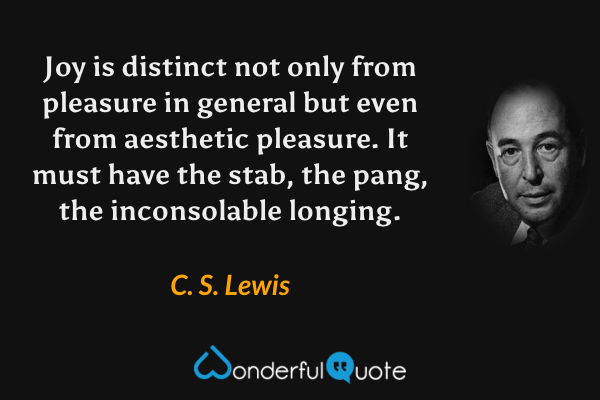
Joy is distinct not only from pleasure in general but even from aesthetic pleasure. It must have the stab, the pang, the inconsolable longing.
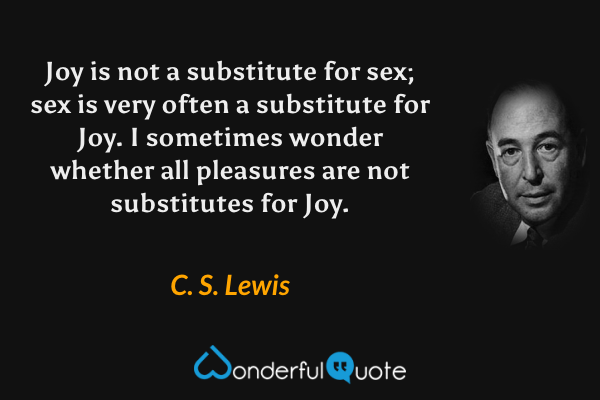
Joy is not a substitute for sex; sex is very often a substitute for Joy. I sometimes wonder whether all pleasures are not substitutes for Joy.
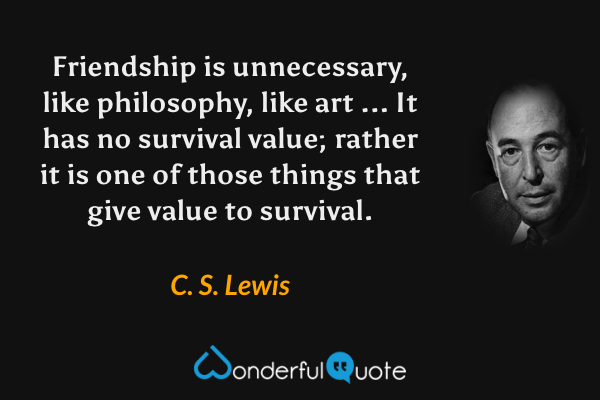
Friendship is unnecessary, like philosophy, like art ... It has no survival value; rather it is one of those things that give value to survival.
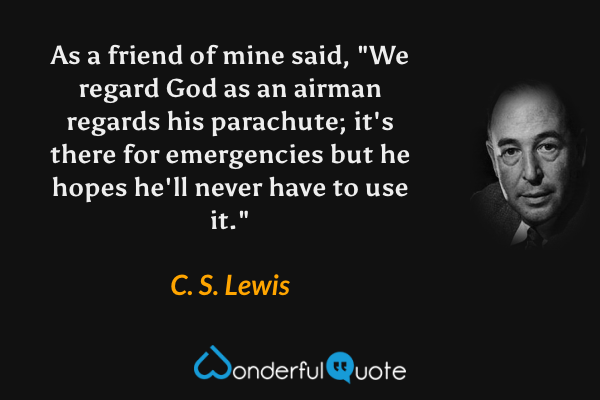
As a friend of mine said, "We regard God as an airman regards his parachute; it's there for emergencies but he hopes he'll never have to use it."

If the universe is so bad, or even half so bad, how on earth did human beings ever come to attribute it to the activity of a wise and good Creator?

The higher animals are in a sense drawn into Man when he loves them and makes them (as he does) much more nearly human than they would otherwise be.

The limit of giving is to be the limit of our ability to give. We must not consider ourselves free to refuse because those who ask us are undeserving.

When a man who accepts the Christian doctrine lives unworthily of it, it is much clearer to say he is a bad Christian than to say he is not a Christian.
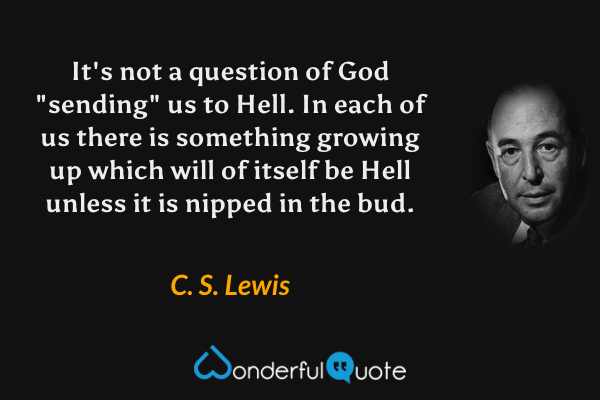
It's not a question of God "sending" us to Hell. In each of us there is something growing up which will of itself be Hell unless it is nipped in the bud.

No philosophical theory which I have yet come across is a radical improvement on the words of Genesis, that "In the beginning God made Heaven and Earth."

Your place in heaven will seem to be made for you and you alone, because you were made for it—made for it stitch by stitch as a glove is made for a hand.
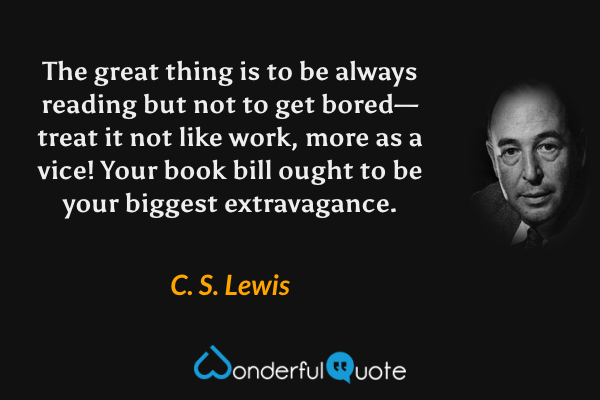
The great thing is to be always reading but not to get bored—treat it not like work, more as a vice! Your book bill ought to be your biggest extravagance.

A glimpse is not a vision. But to a man on a mountain road by night, a glimpse of the next three feet of road may matter more than a vision of the horizon.

We believe that the death of Christ is just that point in history at which something absolutely unimaginable from outside shows through into our own world.

I think that Resurrection is so much profounder an idea than mere immortality. I am sure we don't just "go on." We really die and are really built up again.

Try to exclude the possibility of suffering which the order of nature and the existence of free wills involve, and you find that you have excluded life itself.
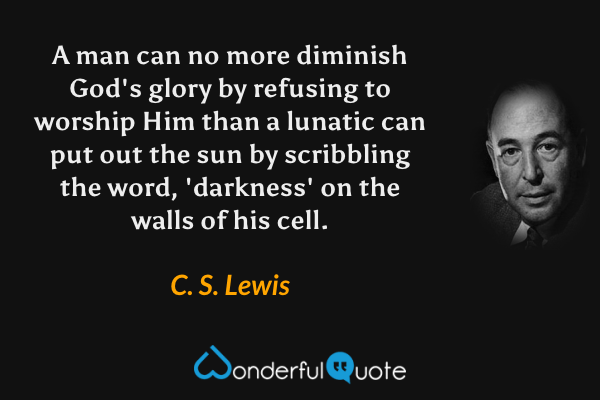
A man can no more diminish God's glory by refusing to worship Him than a lunatic can put out the sun by scribbling the word, 'darkness' on the walls of his cell.

Reality, in fact, is usually something you could not have guessed. That is one of the reasons I believe Christianity. It is a religion you could not have guessed.

It is Christ Himself, not the Bible, who is the true word of God. The Bible, read in the right spirit and with the guidance of good teachers, will bring us to Him.

There are inquiries in which scanty evidence is worth using. We may not be able to get certainty, but we can get probability, and half a loaf is better than no bread.

We are told that Christ was killed for us, that His death has washed out our sins, and that by dying He disabled death itself. That is the formula. That is Christianity.
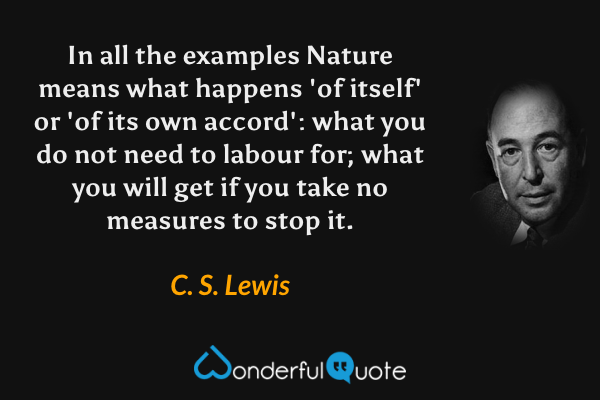
In all the examples Nature means what happens 'of itself' or 'of its own accord': what you do not need to labour for; what you will get if you take no measures to stop it.

Sometimes I can almost think that I was sent back to the false gods there to acquire some capacity for worship against the day when the true God should recall me to Himself.
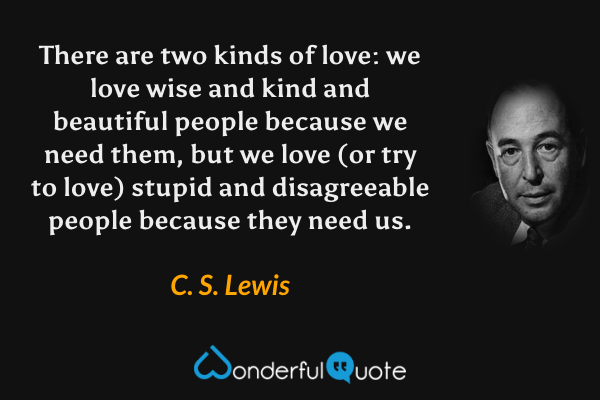
There are two kinds of love: we love wise and kind and beautiful people because we need them, but we love (or try to love) stupid and disagreeable people because they need us.
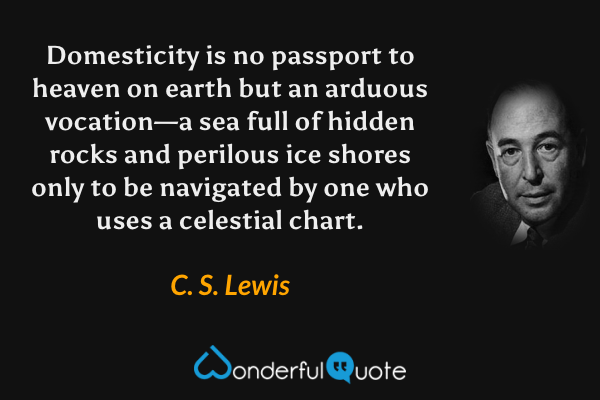
Domesticity is no passport to heaven on earth but an arduous vocation—a sea full of hidden rocks and perilous ice shores only to be navigated by one who uses a celestial chart.

When pain is to be borne, a little courage helps more than much knowledge, a little human sympathy more than much courage, and the least tincture of the love of God more than all.

Surely what a man does when he is taken off his guard is the best evidence for what sort of a man he is? Surely what pops out before the man has time to put on a disguise is the truth?
![I doubt whether anyone who has tasted it [joy] would ever, if both were in his power, exchange it for all the pleasures in the world. But then Joy is never in our power and pleasure often is. - C. S. Lewis quote.](/img/q/18/1718A-i-doubt-whether-anyone-who-has-tasted-it-joy-would-c-s-lewis.png)
I doubt whether anyone who has tasted it [joy] would ever, if both were in his power, exchange it for all the pleasures in the world. But then Joy is never in our power and pleasure often is.
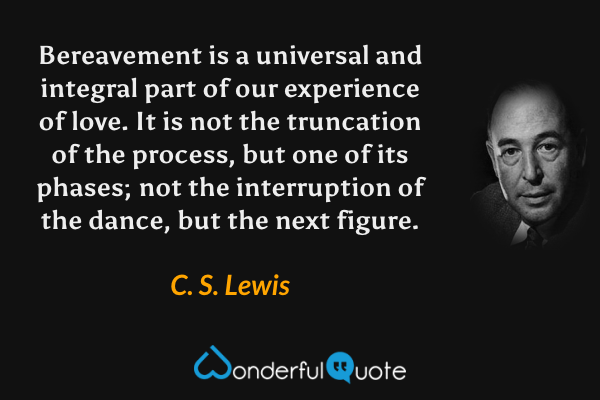
Bereavement is a universal and integral part of our experience of love. It is not the truncation of the process, but one of its phases; not the interruption of the dance, but the next figure.

Language is not an infallible guide, but it contains, with all its defects, a good deal of stored insight and experience. If you begin by flouting it, it has a way of avenging itself later on.

We ought to give thanks for all fortune: it is is good, because it is good, if bad, because it works in us patience, humility and the contempt of this world and the hope of our eternal country.
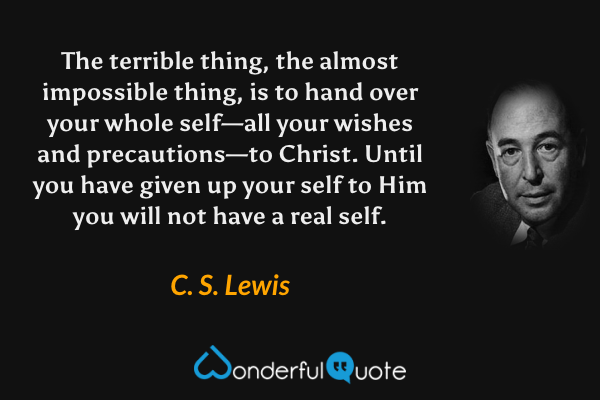
The terrible thing, the almost impossible thing, is to hand over your whole self—all your wishes and precautions—to Christ. Until you have given up your self to Him you will not have a real self.

But if Naturalism is true, then we do know in advance that miracles are impossible: nothing can come into Nature from the outside because there is nothing outside to come in, Nature being everything.

The result of our historical enquiries thus depends on the philosophical views which we have been holding before we even began to look at the evidence. This philosophical question must therefore come first.

Christianity is not the conclusion of a philosophical debate on the origins of the universe: it is a catastrophic historical event following on the long spiritual preparation of humanity which I have described.
![How can people advocate a 'modern' education? What could be better or more enjoyable than reading the greatest masterpieces of all time, under a man [Harry Wakelyn Smith, aka Smugy] who has made them part of himself? - C. S. Lewis quote.](/img/q/63/863A-how-can-people-advocate-a-modern-education-what-could-be-c-s-lewis.png)
How can people advocate a 'modern' education? What could be better or more enjoyable than reading the greatest masterpieces of all time, under a man [Harry Wakelyn Smith, aka Smugy] who has made them part of himself?

The New Testament does not envisage solitary religion: some kind of regular assembly for worship and instruction is everywhere taken for granted in the Epistles. So we must be regular practising members of the Church.

Perhaps one of the reasons why letters are so hard to write and so much harder to read is that people confine themselves to news – in other words think nothing worth writing except that which would not be worth saying.

Do not waste time bothering whether you 'love' your neighbor; act as if you did. As soon as we do this we find one of the great secrets. When you are behaving as if you loved someone, you will presently come to love him.

And do you now begin to see why Christianity has always said that the devil is a fallen angel? That is not a mere story for the children. It is a real recognition of the fact that evil is a parasite, not an original thing.

Christianity tells people to repent and promises them forgiveness. It therefore has nothing (as far as I know) to say to people who do not know they have done anything to repent of and who do not feel that they need forgiveness.

For every one pupil who needs to be guarded from a weak excess of sensibility there are three who need to be awakened for the slumber of cold vulgarity. The task of the modern educator is not to cut down jungles but to irrigate deserts.

It is no more possible for God than for the weakest of His creatures to carry out both of two mutually exclusive alternatives; not because His power meets an obstacle, but because nonsense remains nonsense even when we talk it about God.
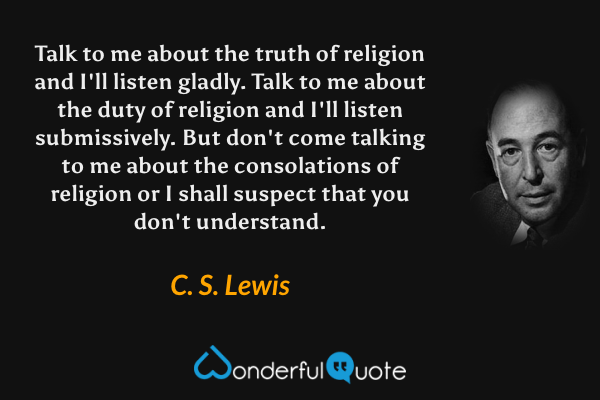
Talk to me about the truth of religion and I'll listen gladly. Talk to me about the duty of religion and I'll listen submissively. But don't come talking to me about the consolations of religion or I shall suspect that you don't understand.
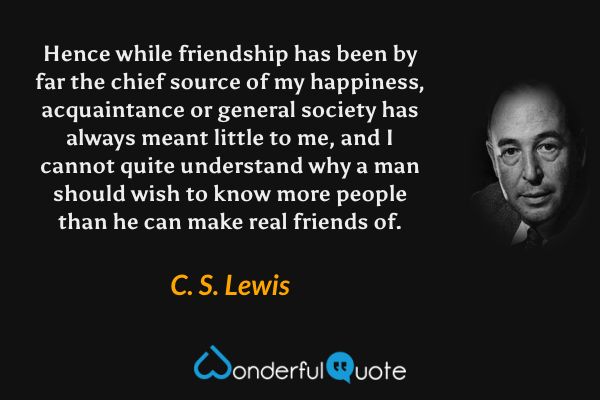
Hence while friendship has been by far the chief source of my happiness, acquaintance or general society has always meant little to me, and I cannot quite understand why a man should wish to know more people than he can make real friends of.

It is the immemorial privilege of letter-writers to commit to paper things they would not say: to write in a more grandiose manner than that in which they speak: and to enlarge upon feelings which would be passed by unnoticed in conversation.
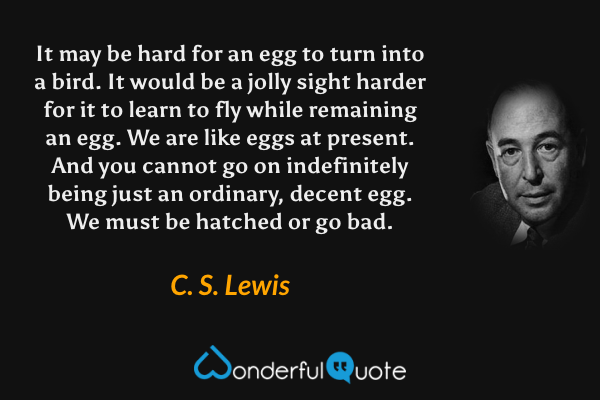
It may be hard for an egg to turn into a bird. It would be a jolly sight harder for it to learn to fly while remaining an egg. We are like eggs at present. And you cannot go on indefinitely being just an ordinary, decent egg. We must be hatched or go bad.

How deep I am just now beginning to see: for I have just passed on from believing in God to definitely believing in Christ – in Christianity. I will try to explain this another time. My long night talk with Dyson and Tolkien had a good deal to do with it.

The only rite which we know to have been instituted by Our Lord Himself is the Holy Communion ("Do this in remembrance of me"—"If you do not eat the flesh of the Son of Man and drink His blood, ye have no life in you"). This is an order and must be obeyed.

In a sort of ghastly simplicity we remove the organ and demand the function. We make men without chests and expect of them virtue and enterprise. We laugh at honour and are shocked to find traitors in our midst. We castrate and bid the geldings be fruitful.

In a sense, it creates, rather than solves, the problem of pain, for pain would be no problem unless, side by side with our daily experience of this painful world, we had received what we think a good assurance that ultimate reality is righteous and loving.

'If God were good, He would wish to make His creatures perfectly happy, and if God were almighty He would be able to do what He wished. But the creatures are not happy. Therefore God lacks either goodness, or power, or both.' This is the problem of pain, in its simplest form.

It would be less terrifying if one could really attribute the murder of beauty to any particular set of evil men: the trouble is that from man's first and wholly legitimate attempt to win safety and ease from Nature it seems, step by step, to lead on quite logically to universal suburbia.
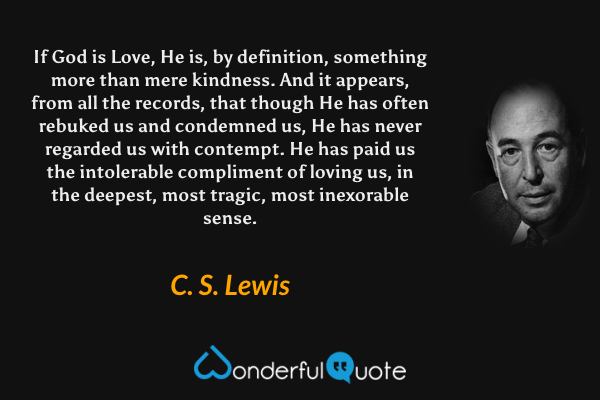
If God is Love, He is, by definition, something more than mere kindness. And it appears, from all the records, that though He has often rebuked us and condemned us, He has never regarded us with contempt. He has paid us the intolerable compliment of loving us, in the deepest, most tragic, most inexorable sense.

Has it ever struck you that one of the most serious consequences of this war is what Kirk calls 'the survival of the unfittest'? All those who have the courage to do so and are physically sound, are going off to be shot: those who survive are moral and physical weeds – a fact which does not promise favourably for the next generation.

What I like about experience is that it is such an honest thing. You may take any number of wrong turnings; but keep your eyes open and you will not be allowed to go very far before the warning signs appear. You may have deceived yourself, but experience is not trying to deceive you. The universe rings true wherever you fairly test it.
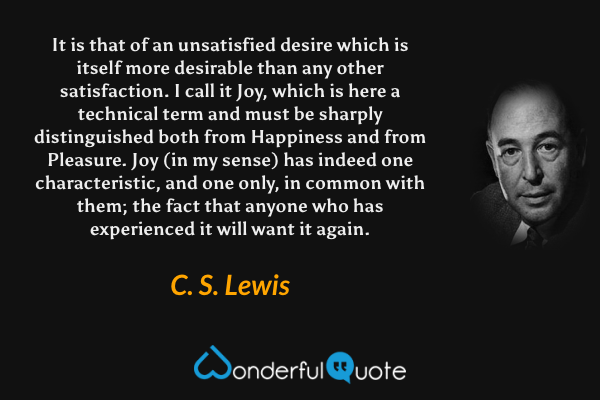
It is that of an unsatisfied desire which is itself more desirable than any other satisfaction. I call it Joy, which is here a technical term and must be sharply distinguished both from Happiness and from Pleasure. Joy (in my sense) has indeed one characteristic, and one only, in common with them; the fact that anyone who has experienced it will want it again.

Thus no thoroughgoing Naturalist believes in free will: for free will would mean that human beings have the power of independent action, the power of doing something more or other than what was involved by the total series of events. And any such separate power of originating events is what the Naturalist denies. Spontaneity, originality, action 'on its own', is a privilege reserved for 'the whole show', which he calls Nature.

There are only two views that face all the facts. One is the Christian view that this is a good world that has gone wrong, but still retains the memory of what it ought to have been. The other is the view called Dualism. Dualism means the belief that there are two equal and independent powers at the back of everything, one of them good and the other bad, and that this universe is the battlefield in which they fight out an endless war.
Aim at Heaven and you will get Earth thrown in. Aim at Earth and you get neither.
Aim at Heaven and you will get earth 'thrown in': aim at earth and you get neither.
Aim at Heaven and you will get earth 'thrown in': aim at earth and you will get neither.
Of all tyrannies, a tyranny sincerely exercised for the good of its victims may be the most oppressive.
Of all tyrannies a tyranny sincerely exercised for the good of its victims may be the most oppressive. It may be better to live under robber barons than under omnipotent moral busybodies.


